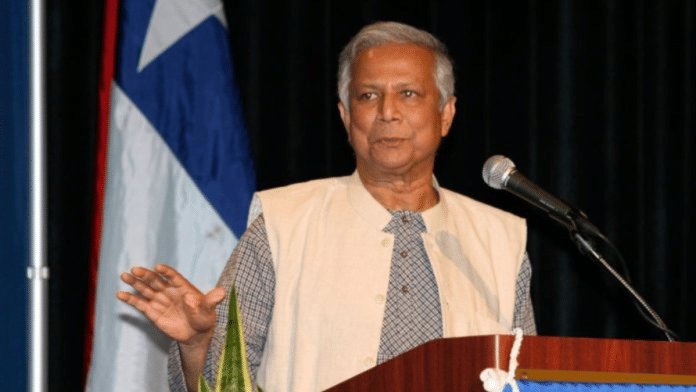New Delhi: In a message to the nation, Muhammad Yunus Wednesday appealed for calm in Bangladesh ahead of his return from Paris to be sworn in as the head of the country’s new interim government.
“I congratulate the brave students who took the lead in making our Second Victory Day possible and to the people for giving your total support to them. Let us make the best use of our new victory. Let us not let this slip away because of our mistakes. I fervently appeal to everybody to stay calm,” said Yunus in a statement published by the Yunus Centre.
He added: “Please refrain from all kinds of violence. I appeal to all students, members of all political parties and non-political people to stay calm. This is our beautiful country with lots of exciting possibilities. We must protect and make it a wonderful country for us and for our future generations.”
The Nobel Laureate is likely to be sworn in Thursday evening, Army chief General Waker-Uz-Zaman said during a press conference Wednesday.
Yunus was appointed as the head of the interim government late Tuesday night after a meeting between the leaders of the student movement and the Bangladesh President Mohammad Shahabuddin at Bangabhaban, the president’s official residence in Dhaka. The new interim government was announced on Monday after the resignation of prime minister Sheikh Hasina following nearly two months of protests against her government.
Yunus said that “violence is our enemy” and pleaded with the country to prevent creating “more enemies”.
“If we take the path of violence everything will be destroyed. Please stay calm. Help those around you to stay calm,” he said.
His comments come amid reports of attacks against memorials of the country’s founder Sheikh Mujibur Rahman in Dhaka, targeted attacks against members of Hasina’s Awami League, as well as the looting and destruction of houses and businesses of minorities across the country.
At least 400 buildings belonging to minority communities, particularly Hindus, have been attacked and destroyed by mobs across 30 districts in Bangladesh, ThePrint reported earlier. There have been reports of attacks against the minority Muslim community of Ahmadiyyas as well.
Student demonstrators were seen forming groups to protect properties belonging to minorities from attacks across the country.
Hasina, who led the country from 2009 until Monday, resigned and fled the country after nearly two months of anti-quota protests, with the first outbreak of violence on 15 July.
At least 200 people were killed in the brutal crackdown initiated by her government in July. Protests were temporarily halted after the Supreme Court of Bangladesh reduced the reservations for families of veterans from the 1971 Bangladesh Liberation War from 30 percent to 5 percent on 21 July.
However, protests resumed Friday, and, on Sunday a further 100 protesters were reported to have been killed in the government crackdown. By Monday evening, Hasina had left the country and arrived in India. The Parliament of Bangladesh was dissolved Tuesday and later that evening Shahabuddin appointed Yunus as the head of the interim government.
(Edited by Sanya Mathur)
Also read: China is keeping a close watch on Bangladesh. It’s an opportunity to counterbalance India






